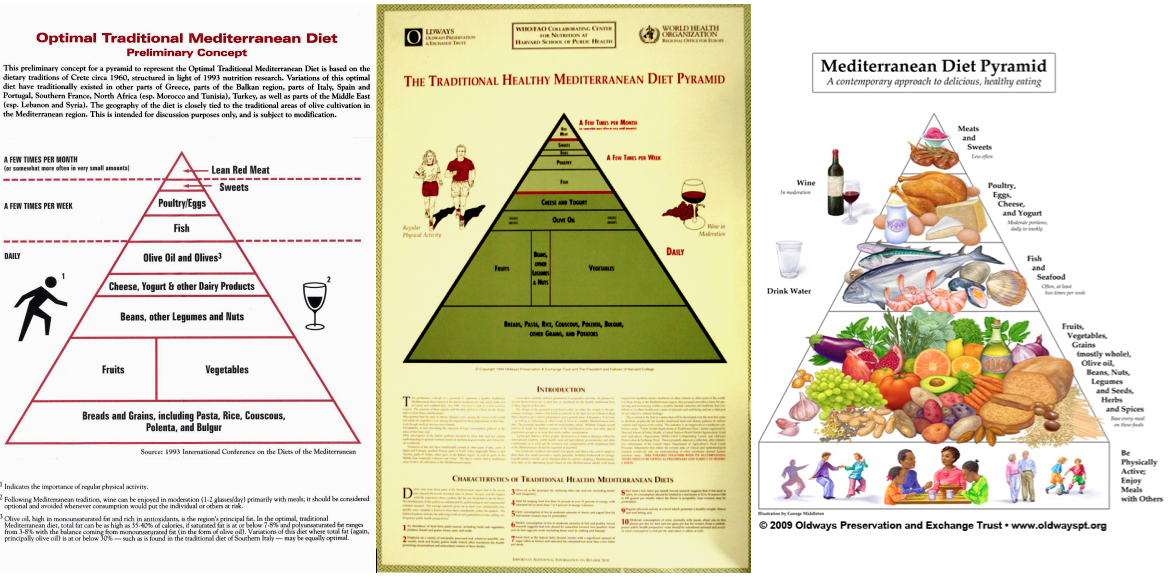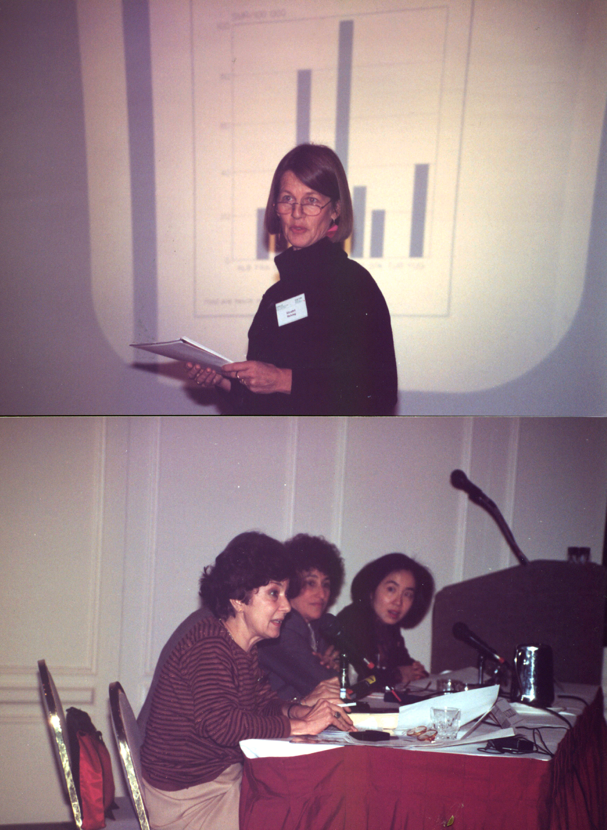Share This
Want to learn more? Read about the Mediterranean Diet, get started on a 4-Week Menu Plan, and join our Mediterranean Diet Facebook group!
The Mediterranean Diet has a rich history that dates back centuries in time. In a journal article, European scientists explain that “the Mediterranean diet has its origins in a portion of land considered unique in its kind, the Mediterranean basin, which historians call ‘the cradle of society,’ because within its geographical borders the whole history of the ancient world took place.” The cradle of civilization refers to the civilizations of the Sumerians, Assyrians, Babylonians, Persians, Greeks, and Romans. But as a nutritional recommendation, the Mediterranean Diet and the graphic representation, the Mediterranean Diet Pyramid, are much more recent.
In the early 1990s, as Oldways was getting started, our work to preserve and promote the healthy “old ways of eating” focused on the Mediterranean Diet, the pattern of eating with the most scientific research on the subject. Ancel Keys’ Seven Countries Study was the foundation of this research.
As we’ve written on the Oldways website, shortly after World War II, Ancel Keys and colleagues (including Paul Dudley White, later President Eisenhower’s heart doctor) organized the remarkable Seven Countries Study to examine the hypothesis that Mediterranean-eating patterns contributed directly to improved health outcomes. This long-running study examined the health of almost 13,000 middle-aged men in the United States, Japan, Italy, Greece, the Netherlands, Finland, and then-Yugoslavia.
When the data were examined, it was clear that people who ate a diet where fruits, vegetables, grains, beans, and fish were the basis of daily meals were the healthiest. Topping the chart were residents of Crete, in Greece. Even after the deprivations of World War II — and in part, perhaps, because of them — the cardiovascular health of Crete’s residents exceeded that of US residents. Researchers attributed the differences to diet.
Out of this extensive work came an understanding that certain Mediterranean-eating patterns were remarkably connected with good health. From this conclusion emerged the concept of a “Mediterranean Diet” that could promote lifelong good health.
In 1993, Oldways and the Harvard School of Public Health organized an International Conference on the Diets of the Mediterranean in Cambridge, Massachusetts, bringing together scientists from the Mediterranean and the US, including Ancel Keys as the keynote speaker. Initially our purpose was to describe the Mediterranean Diet as a way of encouraging people everywhere to follow the tenets of this healthy, delicious way of eating.
The Conference was chaired by Dimitrios Trichopoulos of the Harvard School of Public Health, Marion Nestle of New York University, Walter Willett, Harvard School of Public Health, Antonia Trichopoulou of the Athens School of Medicine, and Elisabet Helsing, Nutrition Officer of the World Health Organization, among others. The speakers were also an international cast of leading nutrition scientists, including Daan Kromhout from The Netherlands, one of Ancel Keys collaborators on the Seven Countries Study, Frank Sacks and Meir Stampfer of the Harvard School of Public Health, and Luis Serra Majem of Spain, to name just a few.
The scientists and Oldways met for several years ahead of the January 1993 Conference to discuss the program and how we would describe the Mediterranean Diet. The group discussed the characteristics of the Mediterranean Diet that would be presented to the Conference and how it would be communicated to consumers worldwide. As the discussions went forward, we realized that it would be difficult to convey our message with only a long list of characteristics. We were very aware that we’d never make the front page of USA Today, The New York Times, or The Wall Street Journal with this list of words. So, we borrowed a concept from the government! The USDA had just released its first Food Pyramid in 1992, and we decided to turn our list of characteristics into a graphic, depicting the healthy, delicious, traditional diets of the Mediterranean.
Drafts of the dietary characteristics and the pyramid were presented to a larger group of scientists, who, after the sessions were over on the second day of the three-day conference, deliberated and debated the Original Concept of the Mediterranean Diet Pyramid. After the discussion, the result was sent to Karen McCann, our first graphic designer, who prepared the initial pyramid that was presented at the final session on the third day of the Conference (see top of page).
The Mediterranean Diet did make it into USA Today and many other publications in 1993, and then again in 1994, when the Official Traditional Mediterranean Diet Pyramid was adopted at a second Oldways Mediterranean Diet Conference in San Francisco in June (see below). This time the World Health Organization also signed on. The Mediterranean Diet Pyramid has since been updated by a scientific committee meeting at the 15th Anniversary Mediterranean Diet Conference. The 2009 update puts more emphasis on fish and seafood; brings all plant foods together; and adds water, herbs and spices, and additional lifestyle attributes such as eating together, dancing, and walking (see top of page).
Since 1993 the Mediterranean Diet Pyramid has appeared in thousands of newspaper and magazine articles, journals, cookbooks, brochures, and textbooks. Today, it is used by researchers, doctors, dietitians, hospitals, government agencies, writers, and others who care deeply about communicating the message of healthy eating by following the Mediterranean Diet. This is our message at Oldways, and we hope that this 9th annual celebration of Mediterranean Diet Month in May will bring even more attention to this delicious and healthy way of eating. HAPPY MEDITERRANEAN DIET MONTH!
Sara Baer-Sinnott, Oldways President





Comments
Add a Comment